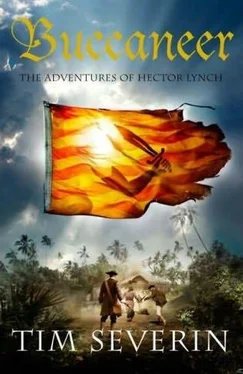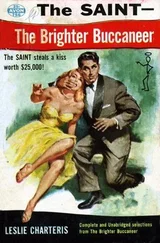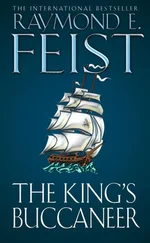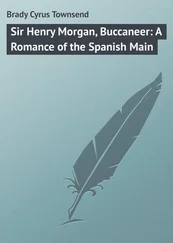'But we don't know where to find the pirates, nor their number,' objected the governor. He had a habit of tugging at his right ear lobe when he was worried. 'They could be anywhere. The coast is a maze of islands and inlets. Our forces could search for weeks and not discover them. Meanwhile the city would be left without protection.'
'Could we not ask the Indians to keep a look out on our behalf?' The suggestion came from the bishop. He was newly arrived from Old Spain, and had yet to learn that the Indians were not the devout and loyal Christians he had been led to expect.
'The Indians!' exclaimed the cavalry colonel, his mouth turned down in a grimace. 'It was the Indians who showed the pirates their trail over the mountains.'
'There's no need to go searching for the pirates. They will come to us,' said a quiet, firm voice. The speaker was Capitan del Navio, Francisco de Peralta. His swarthy tan and the maze of lines and wrinkles on his face were the legacy of a lifetime sailing the Pacific Ocean. For thirty years Don Francisco had worn a furrow in the sea between Panama and the southern ports of the viceroyalty of Peru. There was hardly a vessel which he had not commanded, navigated or escorted - galleons with cargoes of bullion, tubby ureas loaded with merchandise, fast pataches carrying official correspondence, even a pasaca-ballo, a flat-bottomed horse ferry, out of which he had once disembarked a troop of cavalry to fight the Aurocanos in Chile. Now, as Capitan del Navio, his ship was a barca longa, an armed brigantine, anchored off Panama City.
'The pirates have succeeded in crossing the mountains, but they find themselves in a quandary,' Peralta went on. 'They must have boats if they are to reach and attack Panama. To march overland along the coast is too slow and too hazardous. The only craft available to them will be small dugout canoes made by the Indians, and perhaps a piragua or two. This makes them vulnerable.'
Barahona had grasped the point Peralta was making. 'We must shut down the sea lanes. None of our vessels are to sail from any port. All those currently at sea will be ordered into harbour,' he said.
'But surely we should send out boats to warn our coastal settlements that the pirates are on the prowl,' protested the bishop. He was feeling piqued that his earlier suggestion had been dismissed out of hand.
'No. The pirates might capture our vessels and turn them against us.'
'What naval forces do we have to defend us if the pirates do get this far?' The governor put the question directly to Barahona though he already knew the answer. It was better that the civilians and the Churchmen were made aware just how acute the danger was.
'There are five merchant ships currently at anchor. One of them, La Santissima Trinidad, is a large galleon, but currently she is fitted out as a merchant vessel so has no armament. Then there are the three small warships of the South Sea squadron.' Barahona was careful to describe the colonial navy as an armadilla, a squadron. Its official title might be far grander as an Armada or Fleet, but the merchants of Peru and Panama had been stingy about paying the situados, the special taxes which were meant to fund the colony's defences. So now the royal vessels were few in number, undersize and decrepit. The warships at his disposal were barca longas like Peralta's, a two-masted craft equipped with a dozen cannon.
'Surely that should be sufficient to deal with a handful of pirates in canoes,' sniffed the cavalry colonel.
'Our main problem is not in ships, but in men,' retorted Barahona crisply. As always the land soldiers overlooked the fact that sailors took far longer to train than infantrymen.
'We have enough competent seamen to man just one of the warships. They are mostly Biscayners, so they are prime seamen and excellent at their job. But the other two vessels will be relying on locally raised crews.' Barahona's eyes flicked towards Peralta and the officer seated next to him, Capitan Diego de Carabaxal. The latter was a competent seaman but Barahona was not sure that Carabaxal would have the necessary courage when it came to a fight. 'Both those vessels are short-handed. So I propose stripping the merchant ships of their sailors and redistributing their men to the warships.'
'Is that wise? Without crews they cannot save themselves,' objected one of the councillors. From the note of alarm in the man's voice Peralta suspected that he was part-owner of one of the merchant ships and dismayed at the threat to his investment.
'If any merchant ship is about to fall into the hands of the pirates, it will be scuttled or burned on my orders.' Barahona had the satisfaction of seeing the councillor go pale at the prospect.
'Then it's decided,' announced the governor. 'The armadilla will put itself in a state of readiness to intercept and destroy the pirates while they are still in small boats. The land forces are to concentrate in the city and look to the defences should the pirates succeed in coming ashore.'
The bishop closed the meeting with a prayer for salvation, beseeching the Almighty to thwart the evil designs of the heathen sea robbers, and Francisco de Peralta left the governor's office. He had only a short walk to where his ship's cockboat was waiting. As he crossed the main square of New Panama, he remembered what it had been like the last time the pirates had attacked. Henry Morgan, the great pirate, had marched across die isthmus with 1,200 men. A garrison of four regiments of foot and two squadrons of horse had failed to stop a ragtag force so poorly supplied that the bandits had been obliged to eat their leather satchels during their advance. The entire city, seven thousand households, had panicked. People ran about, frantically hiding their valuables down wells and cisterns or in holes in walls. Then they fled into the countryside, trying to escape before the city was invested.
Peralta had received orders to warp his ship up to the quays. There he had taken on an astonishing variety of refugees and their baggage - nuns and priests, high-born ladies with their children and servants, senior government officials. They had brought the contents of the city treasury, boxes of official deeds and documents, sacks stuffed with church plate, paintings, sacred relics hastily wrapped in altar cloths, chests of privately owned jewellery, gold, pearls, all manner of portable wealth. The value of the cargo rushed aboard his vessel that day had exceeded all that was left behind in the city for the pirates to plunder. In vain he had warned that his vessel was not fit for sea. Its sole defence was seven cannon and a dozen muskets, and her sails had been condemned and taken ashore. No one listened. Everyone begged him to leave port at once and save them and their goods.
What followed had seemed like a miracle. His grossly overloaded vessel had cast off, and his crew had spread a set of topsails, the only canvas they still had on board. It was barely enough to push the vessel through the water. Half-sailing, half drifting on the current, his ship had limped away from the city, and Peralta had spent the next forty-eight hours waiting for the pirates to commandeer local boats, catch up and take their plunder. A score of pirates in a piragua would have been enough. But it never happened. The enemy failed to appear, and for years he had wondered why. Eventually he had learned that the pirates had got drunk. They had wasted so much time on shore, guzzling captured wine, that when they emerged from their stupor Peralta and his precious cargo had drifted away over the horizon.
Don Francisco allowed himself a wry grin at the memory. The ladrones del mar, the sea thieves as he thought of them, were courageous and unpredictable. But they had two weaknesses: a love of strong drink and a tendency to quarrel among themselves. Given enough time, they usually fell into disarray and returned from where they had come.
Читать дальше








